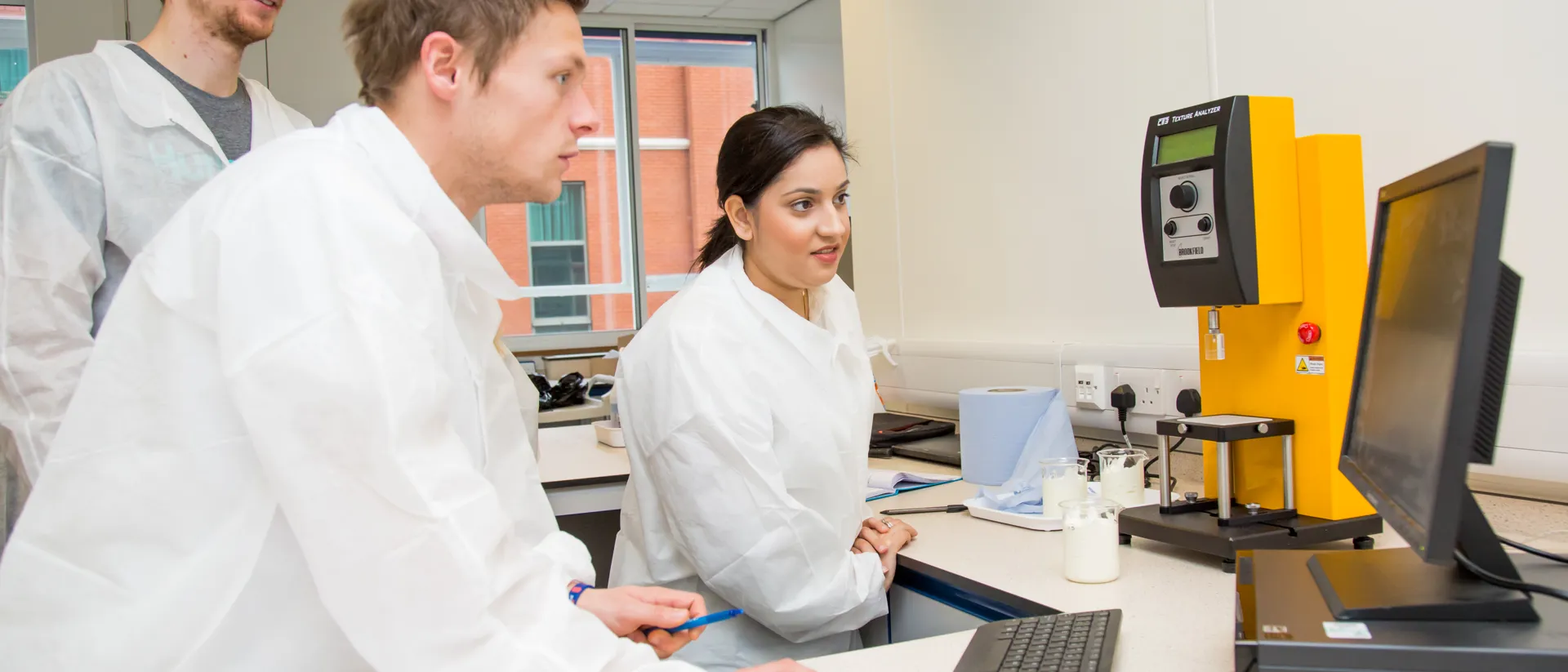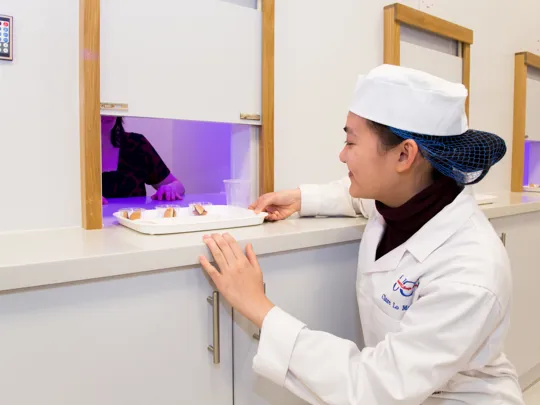of graduate employers say relevant experience is essential to getting a job with them
Why should I choose this course?
- PRACTICE PLACEMENTS – Gain practical experience on multiple placements in a range of clinical and public health settings, including hospitals, community health organisations, catering and public health, as well as simulated-based learning in state-of-the-art simulation facilities
- INTERNATIONAL EXPERIENCE – A full programme of enrichment across two years of study including an international field trip
- EXPERT TUITION – Learn from our highly-qualified academics, who have extensive knowledge and experience in nutrition and dietetics
Our facilities
As a student on our Dietetics course at University College Birmingham, you will have access to our university healthcare and food facilities, including our Health Skills and Simulation Suite. This includes a purpose-built six-bed hospital ward to help you practise your clinical dietetic skills and enhance your practical training. Furthermore, you will practise your culinary application of the science of food and its therapeutic application in our outstanding food industry training facilities.
Course breakdown
- Postgraduate
Year 1
Science of Human Nutrition, Anatomy and Physiology
This module is designed to provide a comprehensive understanding of the scientific foundations underlying the field of dietetics. Throughout this module, you will delve into the intricate relationship between nutrition and human physiology, exploring how nutrients impact cellular mechanisms and gene expression. You will gain in-depth knowledge of human anatomy and physiology, with a specific focus on the gastrointestinal system and its role in digestion, absorption, and nutrient metabolism. By studying the science of human nutrition, you will learn about the sources of nutrients, functional foods, and bioactive substances, and their impact on health and disease processes throughout the lifespan. This knowledge will form the basis for developing dietary recommendations and interventions to optimize health outcomes. Through an exploration of anatomy and physiology, you will understand the structure and function of the human body, including major organs, tissues, and body systems. This understanding will provide you with the foundation to comprehend the physiological basis of nutrition-related disorders and understand the role biochemistry plays in human nutrition.
Clinical Dietetics: The Person-Centred Dietitian
This module is designed to provide students with a solid foundation in clinical medicine and its application to diet therapy. Additionally, students will be introduced to the professional and ethical framework underpinning dietetic practice. Through this module, you will develop a comprehensive understanding of various medical conditions and their relationship to nutrition. You will explore the pathophysiology, clinical manifestations, and diagnostic approaches of common diseases, gaining insights into the impact of these conditions on nutritional status and dietary requirements. By integrating clinical knowledge with diet therapy principles, you will learn how to develop evidence-based nutritional interventions for individuals with specific medical conditions. You will explore the role of diet in disease management and prevention and acquire skills to provide personalised dietary recommendations that align with the unique needs of each patient. Throughout the module, you will engage in case studies and practical exercises to enhance your critical thinking and problem-solving abilities in the context of clinical medicine. You will also learn to collaborate effectively within interdisciplinary healthcare teams, applying your knowledge and skills to provide comprehensive and patient-centred care. This module prepares students for undertaking Practice Based Learning (PBL) B.
Social and Behavioural Aspects of Food
This module explores the intricate relationship between food and society, shedding light on the social and behavioural factors that influence our food choices, eating behaviours and overall nutritional well-being. Throughout this module you will delve into the social and cultural dimensions of food. You will develop an understanding of how factors such as social norms, cultural beliefs, and socioeconomic influences shape our food preferences, dietary patterns, and access to healthy food options. You will explore the impact of food marketing, food environments, and food policies on individual and population health outcomes. By studying the behavioural aspects of food, you will gain insights into the psychological factors that influence our eating behaviours, including the roles of emotions, habits, and cognitive processes. You will examine theories of behaviour change, learn strategies to promote healthy eating habits, encourage sustainable dietary choices and address disordered eating behaviours. Through case studies and practical kitchen sessions within our Birmingham College of Food, you will develop culinary and critical thinking skills and learn to apply social and behavioural theories to real-world scenarios. You will also explore the importance of effective communication and behaviour change techniques in supporting individuals and communities to make informed and sustainable food choices.
Public Health Nutrition: A Whole Systems Approach
This module adopts a whole systems approach to public health and locates the role of the dietitian within this framework. It is underpinned by the ‘Council of Deans of Health Public Health Content within the Pre-Registration Curricula for Allied Health Professions’ (Council of Deans of Health 2021). You will gain an understanding of the unique skills and expertise that dietitians bring to community-based healthcare settings, and how they collaborate with other healthcare professionals to address public health challenges. By appraising a whole systems approach to public health, you will learn about the social determinants of health, health inequalities, and the impact of these on the health and well-being of populations, and subsequent food choices. You will develop the knowledge and skills needed to assess community health needs; plan, implement and evaluate nutrition related health promotion / public health interventions. As part of this module students will undertake a period of practice placement (PBL A) and will be expected to demonstrate an awareness of the systems underpinning dietetic practice, including the role of nurses and AHP’s within healthcare, food, catering and public health.
Evidence Based Practice and Research in Dietetics
This module is designed to equip students with the essential skills and knowledge to conduct rigorous and evidence-based research in the field of nutrition and dietetics. Throughout this module, you will explore various research methodologies and study designs commonly used in nutrition and dietetic research. You will learn how to formulate research questions, design studies, collect and analyse data, and interpret research findings. By studying research methods specific to nutrition and dietetics, you will gain a deep understanding of the unique considerations and challenges in conducting research in this field. You will explore topics such as dietary assessment methods, intervention design, data analysis techniques, and ethical considerations in human research. Through a problem-based learning approach, you will have the opportunity to apply your learning and develop research proposals, honing your critical thinking and problem-solving skills. You will also learn how to effectively communicate and disseminate research findings through scientific writing and presentations.
Year 2
Clinical Dietetics – The Ethical and Professional Dietitian
This comprehensive module explores the intersection of clinical medicine and diet therapy, covering a wide range of specialised topics to equip you with advanced knowledge and skills in providing evidence-based dietetic care. Throughout this module, you will delve into critical care and burns, renal disorders, liver diseases, palliative care, pancreatic conditions, neurodegenerative disorders, multiple and complex allergies, withdrawal of feeds, ethical decision-making, clinical reasoning, reflection, multidisciplinary team working, advocate, and leadership. You will gain in-depth knowledge of each topic, including the pathophysiology, clinical manifestations, diagnostic approaches, and therapeutic interventions related to nutrition. You will learn how to assess nutritional needs, design specialised diets, and implement tailored dietetic interventions to optimise patient outcomes. You will further develop and enhance your knowledge and skills in real-world scenarios and will enrich your clinical reasoning skills, demonstrate effective communication strategies within multidisciplinary teams, and foster strong advocacy and leadership skills. As this module prepares students for undertaking the final Practice Based Learning (PBL) C there is a strong emphasis upon the ethical dilemmas faced by the registered dietitian. Students will be supported through simulation to consolidate their professional and practical skills as a future dietitian.
Leadership, Service Improvement and Sustainability
This module focuses on developing your leadership skills, enhancing your understanding of service improvement methodologies, and exploring sustainability principles within the field of dietetics. Through this module, you will gain advanced knowledge and practical skills in leadership, enabling you to be equipped to effectively lead teams and drive positive change in dietetic practice. You will also build upon knowledge gained in the module ‘Evidence based Practice and Research’ module, including service improvement approaches and tools. This will support you in identifying areas for improvement and implement evidence-based strategies to enhance service delivery and outcomes in dietetics. Furthermore, this module emphasizes the importance of sustainability in dietetics, equipping you with the knowledge to promote environmentally conscious practices and contribute to sustainable healthcare systems. You will explore sustainability principles and strategies to integrate them into your dietetics practice, considering the long-term impact on health, society, and the environment. By the end of this module, you will be equipped with the necessary leadership competencies, service improvement methodologies, and sustainability principles to undertake an independent research project of your choice and be well positioned to be a change agent working within the four pillars of dietetic practice (BDA 2021).
Clinical Dietetics: The Paediatric Dietitian
This module focuses on the unique aspects of providing specialised dietetic care to infants, children, and adolescents. Throughout this module, you will gain a comprehensive understanding of paediatric nutrition, growth and development, and the management of various paediatric conditions. You will explore topics such as infant feeding, childhood obesity, food allergies, feeding difficulties, and nutritional considerations for specific age groups. By studying paediatrics in dietetics, you will develop the skills to assess the nutritional needs of children and address common challenges in paediatric nutrition. You will also learn how to collaborate effectively with families, multiprofessional teams, and community resources to optimize the nutritional well-being of paediatric patients. Through simulation and practical exercises, you will have the opportunity to apply your knowledge and skills in real-world scenarios, honing your critical thinking and problem-solving abilities. You will also learn to navigate ethical consideration.
Portfolio Careers
This module provides a platform from which you as the pre-registration dietetic student can begin to develop a solid foundation for your future career and continual professional development. The scope of the module is informed by recommendations from ‘Future Dietitian 2025’ (Hickson 2025); ‘Post Registration Professional Development Framework’ (BDA 2021) and the ‘Allied Health Professions (AHP) Educator Career Framework’ (Council of Deans of Health 2023). As this module is within the final third of the MSc Dietetics programme you will reflect upon your academic and practice-based learning over the duration of the course and will use these reflections to undertake a ‘skills scan’ of your current strengths and opportunities for further learning and development. You will also be introduced to the support provided by NHS England in terms of Pre-preceptorship (a period of preparation for AHP’s to support your transition towards employment as a registered dietitian). Drawing upon these NHSE resources you will develop your professional development plan for your ‘portfolio career’, which will be underpinned by the four pillars of practice embedded in the BDA (The Association of UK Dietitians) Post Registration Professional Development Framework (BDA 2021).
The Dietetic Care Process
This is an assessment only module (synoptic assessment) which reinforces and assesses learning from the modules ‘Social and Behavioural Aspects of Food / ‘Clinical Dietetics: The Person-Centred Dietitian.’
The modules listed above for this course are regularly reviewed to ensure they are up to date and informed by industry as well as the latest teaching methods. On occasion, we may need to make unexpected changes to modules – if this occurs, we will contact all offer holders as soon as possible.
Entry requirements
Academic
- Applicants must have an honours degree (2:2 or above) in a health or science related subject
- Applications from candidates with relevant experience will be considered on an individual basis. Each application will be considered on its merits and the final decision will be made by the Programme Leader.
- English and Mathematics GCSEs at grade C/grade 4 for above (or equivalent). Non-standard entry applicants will be considered on their merits. Evidence of qualification must be submitted.
- Applicants must supply a full transcript and two academic references at the point of application.
- All students are required to have the following science requirements prior to commencing the MSc Pre-registration Dietetics master's degree:
Biochemistry (minimum 20 credits at Level 4 or above)
Physiology (minimum 20 credits at Level 4 or above)
Any applicant who does not meet the required science is eligible to apply for our six-week blended ‘Foundations of Science for Dietetics’ course. Further details to be confirmed in due course.
International students
For academic and English entry requirements for EU and international students, please visit the Country Specific Information page.
- Applicants should hold an honours degree (2.2 or above) in a health or science related subject.
- Applications from candidates with relevant experience will be considered on an individual basis. Each application will be considered on its merits and the final decision will be made by the Programme Leader.
- IELTS or equivalent*: 7.0 overall, with no component lower than 6.5.
- English and Mathematics GCSEs at grade C/grade 4 for above (or equivalent) non-standard entry applicants will be considered on their merits. Evidence of qualification is also required.
- Applicants must supply a full transcript and two academic references at the point of application.
- In addition, students who have resided outside the UK will be required to provide evidence of a satisfactory overseas police check. Instructions on how to complete these checks will be provided once you hold a firm offer for this course.
*University College Birmingham is developing its own Dietetics English Language pre-entry course. More details to follow.
Please note: As an International Student, when choosing optional placement, a visa extension may be required.
Additional
Pre-course Day
As part of your preparation and application for the course, you must make every reasonable attempt to attend a Pre-course Day event (online or face-to-face) or shadowing a dietitian for a day. This is to support you with your wider understanding of the professional role of a dietitian and in the fields which they work, providing you with further understanding to support with your interview.
All applicants will be interviewed. In line with the National Health Service Constitution, we use a values-based recruitment approach in seeking candidates with the appropriate values to support effective team working in delivering excellent patient care.
The course is designed to meet all the necessary requirements of the HCPC in relation to the standards of proficiency, so that students are eligible to apply for registration as a dietitian and use the protected title of dietitian.
Occupational Health Screening
All applicants will be required to undertake occupational health screening to determine their suitability to undertake the course. The University will provide this free of charge.
Immunisations
All applicants will be required to undertake a programme of immunisations as required by the Department of Health and meet the immunisation and immunity requirements of placement providers. This will be provided by the University free of charge.
If your degree is not related, please contact Admissions so that we can discuss your application on an individual basis before you apply.
If you have any questions, please complete our enquiry form:
Key information
Teaching and assessment
Note: Indicative information only – actual timetables and assessment regimes will be issued at your induction.
- Large group teaching within lectures
- Smaller group teaching in seminars, tutorials, and group discussions
- Problem-based learning
- Kitchen skills development sessions within Birmingham College of Food
- Professional development sessions
- Practice-based learning opportunities
You will also need to commit around 20 hours per week to individual study time.
Assessment
Estimated breakdown of assessment for this postgraduate course:
Year 1
- Coursework– 55%
- Practical assessment– 33%
- Written examinations– 12%
Year 2
- Coursework– 60%
- Practical assessment– 40%
Across the course, students will be assessed in practice and simulation (Minimum of 1000 hours) through completion of practice-based learning (PBL) competencies.
Our teaching and assessment is underpinned by our Teaching, Learning and Assessment Strategy 2021-2024.
Tuition fees
UK students
If you are a UK student or an EU student with settled or pre-settled status enrolling on an MA/MSc course at University College Birmingham, your fee for the academic year 2024/25 will be £9,350. The fee for the PGDip course is £6,350.
View postgraduate fees
International students
If you are an international student enrolling on one of our postgraduate programmes (e.g. MSc, MA) in 2024/25, your fee for this academic year will be £15,000 per year.
Uniform and kit costs
This course requires a uniform and kit (prices are subject to change each year – exact costs and information on how to order required items will be provided to you prior to enrolment).
Unibuddy Community - meet other students on your course
Starting university is an exciting time, but we understand that it can sometimes feel a little daunting. To support you, you will be invited to join our Unibuddy Community, where you can meet other students who have applied for the same course at University College Birmingham, before you start studying here.
As soon as you have been made an offer, you will be sent an invitation email to complete your registration and join the Unibuddy Community. For more information, check out our Unibuddy Community page.
Work placements
Work placements are vital for gaining real-life experience and for building your confidence and skills before you finish your course – and they may even lead to a job when you graduate. Our Hired team can help find the ideal placement for you.
All students on the Dietetics (pre-registration) course are required to complete a minimum of 1,000 hours practice-based learning across the two years of the master's degree. This will be in a range of settings, including hospitals, community settings, local government, private, voluntary and the third sector.
Work alongside experts in your sector
A snapshot of some of the employers we have worked with:
- University Hospitals Birmingham NHS Foundation Trust
- Birmingham Women's and Children's NHS Foundation Trust
- Sandwell and West Birmingham NHS Trust
- Birmingham and Solihull Mental Health Foundation Trust
- Birmingham Community Healthcare NHS Foundation Trust
- Birmingham and Solihull NHS Training Hub
- The Royal Orthopaedic Hospital NHS Foundation Trust
- Healthcare at Home Ltd
"This new and innovative MSc Dietetics course provides students with the opportunity to undertake a comprehensive programme of study with a diverse range of practice-based learning experiences. It takes a multi-professional approach to ensure you are equipped to be a dietitian of the future."
Career opportunities
The example roles and salaries below are intended as a guide only.
Dietitian (Band 5)
Average Salary: £28,407

Anne’s Story
Registered Dietitian Anne is passionate about her subject and has held a number of academic roles within universities in the past 23 years.
Meet your lecturers














